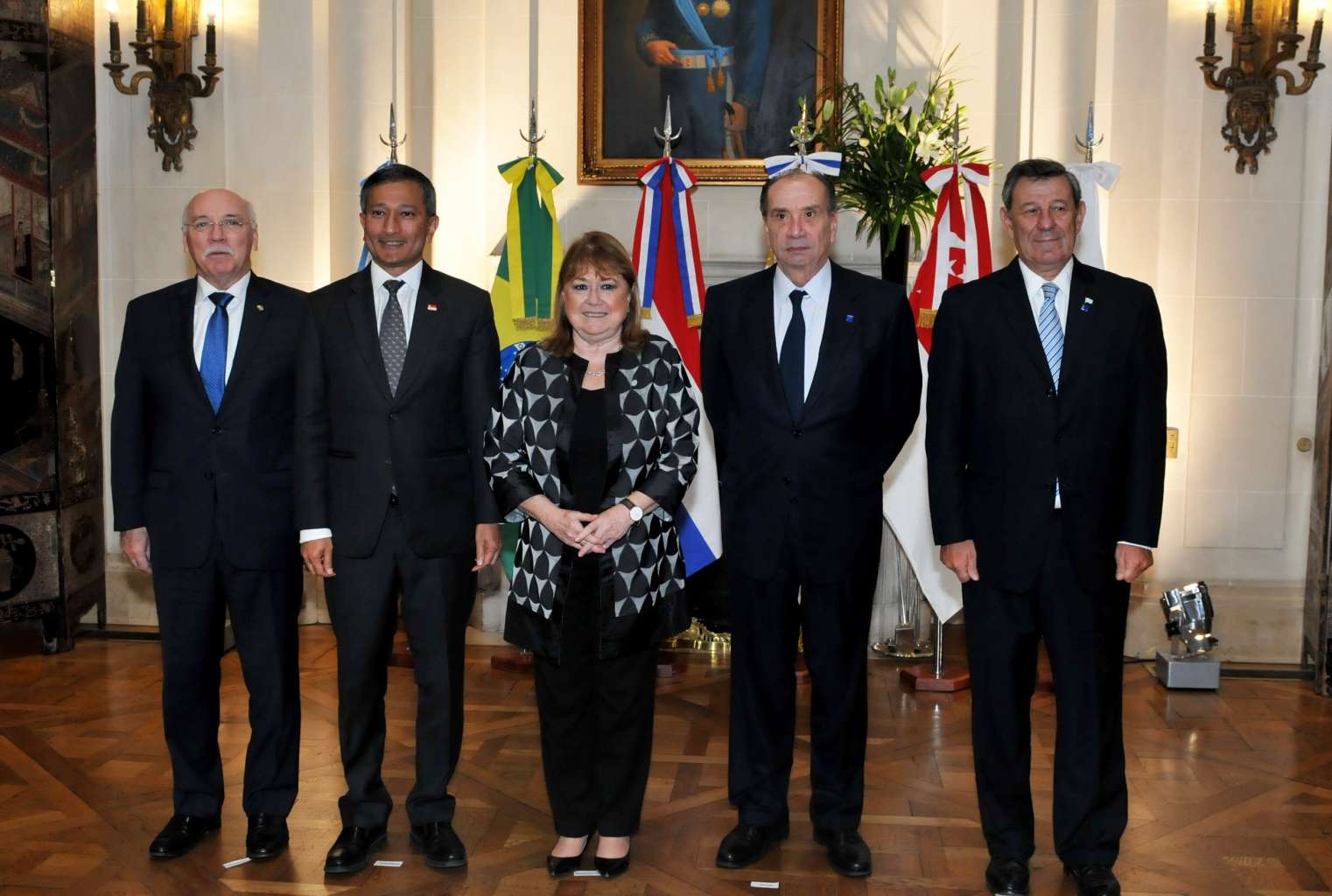S'pore-Brazil at 50: A strong and forward-looking partnership
Sign up now: Get ST's newsletters delivered to your inbox

(From left) The Foreign Minister of Paraguay, Mr Eladio Loizaga; his counterpart of Singapore, Mr Vivian Balakrishnan; of Argentina, Ms Susana Malcorra; of Brazil, Mr Aloysio Nunes Ferreira; and Uruguay's Rodolfo Nin Novoa, participate during a meeting in Buenos Aires, Argentina, on April 7, 2017.
PHOTO: EPA
Last Friday, April 7, in Buenos Aires, I had the privilege to meet with the Minister of Foreign Affairs of Singapore, Vivian Balakrishnan, to discuss our bilateral ties.
This meeting could not have come at a more appropriate time, as we are preparing to commemorate the 50th anniversary of diplomatic relations between our two counties. In fact, Brazil was the first Latin American country to recognize the new Southeast Asian republic. My predecessors' foresight has paid off: our mutually beneficial relations have been providing concrete and tangible results to our peoples.
Being peace-loving nations, respectful of international law and believing strongly in a rules-based international order, Brazil and Singapore find themselves among the staunchest supporters of multilateralism. The public goods derived from a stable set of rules and a mostly peaceful environment generate welcome tailwinds. This is perceived nowhere more so than in the Asia-Pacific, the main engine of world economy and trade.
The unique trajectory of Singapore is widely known and admired. Very few countries have been so successful in such a short period of time. The outstanding performance of Singapore is not limited to tangible measurements such as growth rate, or to being one of the world's top ten by per capita income (as measured both in current dollars or on a PPP basis). Singapore's urban planning, the solutions it has found for mobility in dense urban spaces and the way the housing problem was approached and tackled translated the concept of sustainable development into reality.
Above all, the country's education system is enviable, with Singaporean students ranking first in the world in all three criteria of PISA/OECD. We are aware that to replicate its success story is next to impossible, but useful lessons are to be drawn when adapting it to other countries' local circumstances.
In Brazil, the six-month old government of President Michel Temer is facing a daunting task. The last three years witnessed an unprecedented contraction of economic activity. To address pressing economic challenges, a bold plan of structural reforms was set in motion. These reforms are hard but necessary, and some of them are already paying off. Inflation is well under control, interest rates are declining at a faster pace than anticipated, and our currency is one of the best performing among emerging countries. Confidence is being restored. Unemployment levels are high, but hires are already outpacing layoffs. Last but not least, Brazil is launching new plans for concessions and privatizations, and the rules governing them have been reformed.
Over the years, Singapore and Brazil have built solid ties. In 2016, Singapore ranked among the 15 main destinations for Brazilian exports, ahead of many of our South American partners. In addition, such exports are not limited to mineral and agricultural commodities, as they now also reflect the growing interdependence of our offshore oil and gas industries.
Unbeknownst to many, a significant share of Singapore's domestic consumption of meat comes from Brazil, be it beef, chicken or pork. When most habitants of the island enjoy their chicken rice, it is very likely that they will be savouring chicken from Brazil. As a leading food exporter, Brazil takes very seriously its responsibility to ensure food safety and health. The competence and professionalism of Singaporean authorities and the confidence they placed in the Brazilian inspection and law enforcement systems are to be highly praised.
Brazil's most important and globalized companies have established themselves in Singapore. At the same time, we are happy to be hosting more than 60 Singaporean companies. Singapore is the third largest Asian investor in Brazil, behind China and Japan. Its presence in the oil and gas offshore exploitation is essential. Of course, the current low prices of oil and the necessary restructuring of some major Brazilian companies are not cheerful news, but the fundamentals of the Brazilian oil and gas industry remain strong. The upcoming roadshow of ANP (Brazil's oil and gas agency) in Singapore will reaffirm that Brazilian prospects in this area are excellent.
At my meeting with Minister Balakrishnan, we exchanged notes on the potential of the Mercosur-Singapore trade as a means of expanding our trade and investment ties with the island and with ASEAN as a whole. Moreover, we initiated technical talks between our internal revenue services to clarify aspects of the tax code that have been hindering the flow of investments between our two countries. In particular, Brazil is keen to diversify the sources of foreign capital, an essential component of our economic growth. The jubilee of our bilateral ties is an auspicious occasion for elevating our partnership to new heights, leading to more exchanges, more tourism, more trade, more investment and more people-to-people contacts.
The writer is Brazil's Foreign Minister.


